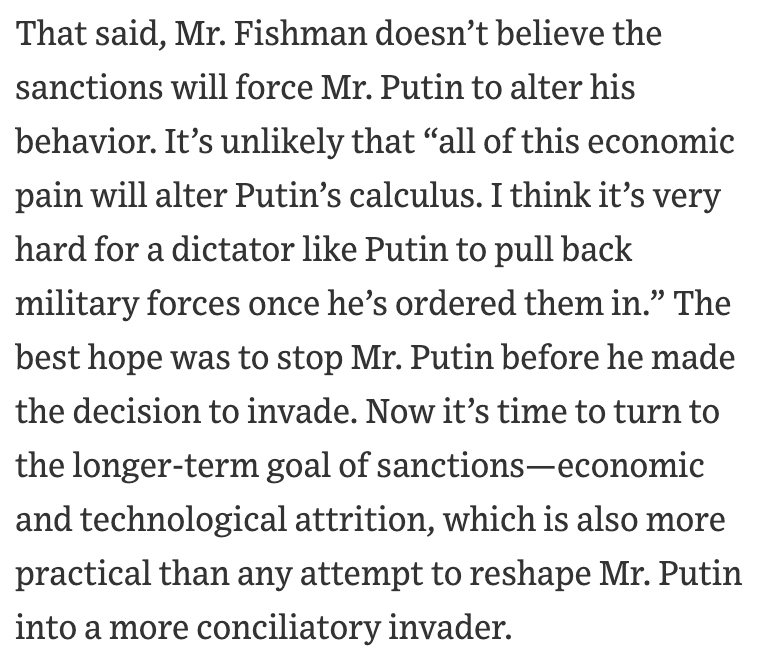
The West's economic pressure campaign against Russia has advanced rapidly.
But many questions remain, including how much further sanctions can go and whether they can change Putin's calculus.
I discussed w/@tunkuv in the @WSJ. A few highlights (🧵): wsj.com/articles/the-w…
But many questions remain, including how much further sanctions can go and whether they can change Putin's calculus.
I discussed w/@tunkuv in the @WSJ. A few highlights (🧵): wsj.com/articles/the-w…
(1) The scale of the sanctions is unprecedented—and the single most significant sanction is the one that targets the Central Bank of Russia. To picture the scale, the CBR has roughly $640b in assets; whereas, at its peak in the early 2010s, Iran's entire GDP was around $550b. 

(2) Putin almost definitely did not anticipate sanctions of this scale. The best evidence is that Moscow left a lot of its assets exposed—around 2/3 of the CBR's assets are denominated in G7 currencies. Deterrence may have failed because Putin underestimated the West. 

(3) These sanctions were made possible by three main factors. First, Ukraine put up much stiffer resistance to Russia's invasion than anyone expected, winning the hearts and minds of the world. By denying Putin a blitzkrieg victory, Ukraine inspired the West to push back hard. 

(4) Second, European opinion shifted dramatically after the invasion. Many (myself included) expected the EU to be laggards on sanctions. Instead, Putin's war shook Europe to the core, building political support for heavy sanctions—even though they would be costly for Europe. 

(5) Third, early warning of Putin's invasion gave the West months to prepare and vet a menu of sanctions options. Since last fall, the G7 has been intensively coordinating sanctions. That's why they were ready as soon as Putin ordered tanks to roll (a big difference from 2014). 

(6) While sanctions are unprecedented in scale, they're not yet comprehensive. The West retains ample room to increase pressure, if needed. Most significant, the West could impose an Iran-style pressure campaign on Russia's oil sales, reducing exports and locking funds offshore. 

(7) The West could also expand full-blocking sanctions to additional Russian banks, including Sberbank (which is by far Russia's largest), as well as to non-financial state-owned enterprises across the energy, defense, mining, transport, shipping, and telecommunications sectors. 

(8) Will China be Putin's white knight? I'm skeptical. Yes, Beijing will exploit the situation to advance its interests. But I doubt Beijing wants to be perceived as bankrolling Putin's imperialism. And a Sino-Russian alternative to the global financial system is a pipe dream. 

(9) Will all this pressure change Putin's calculus? Sadly, it probably won't. But it does give Putin a powerful reason (in addition to Ukraine's tough resistance) to cut a deal. Even if Putin persists, sanctions remain valuable as they'll degrade Putin's capacity to do more harm. 

(10) If Putin continues the war, Russia will become "North Korea on the Volga"—a pariah that is isolated economically and politically. This will be terrible for the Russian people, who deserve better. It's no cause for celebration. But right now, it's the likeliest outcome. /end 

• • •
Missing some Tweet in this thread? You can try to
force a refresh





